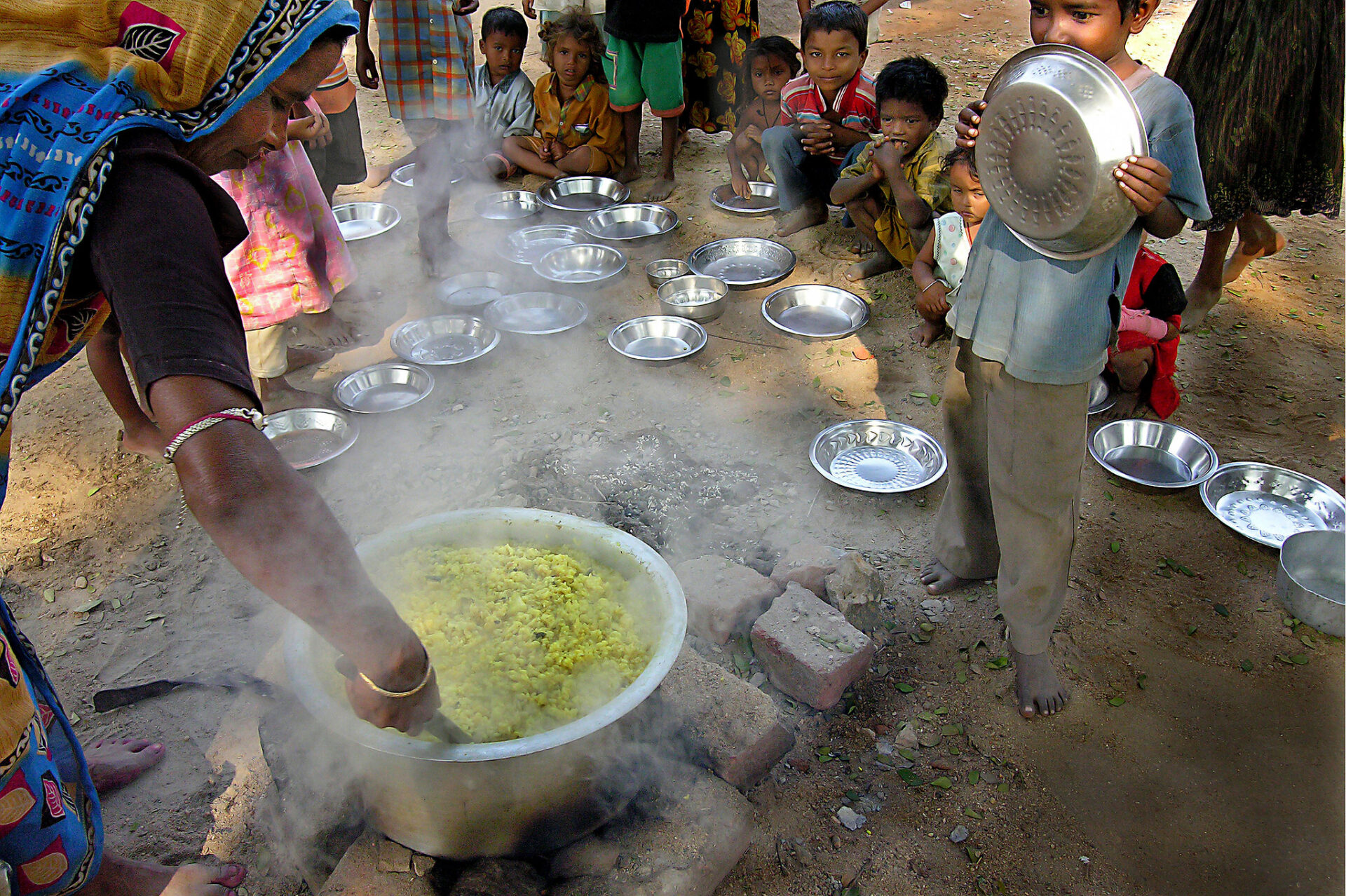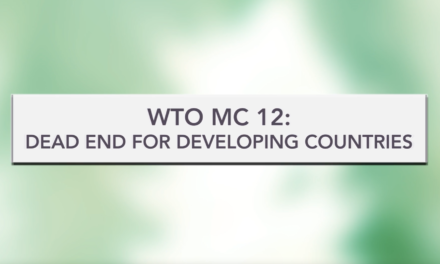
Midday Meal—Woman serving the meal at children’s school. © ILO/ Shyamal Das
by Ranjini Basu and Shalmali Guttal
13 June 2022
The 12th Ministerial Conference (MC 12) of the World Trade Organisation (WTO) is taking place against the backdrop of the Covid-19 pandemic, accelerating climate change, the Russia-Ukraine war and a fast-aggravating global food crisis. Since the Ministerial is taking place after a gap of five years, the expectations of developing country members are that longstanding trade issues, which are crucial for the vast majority of the world’s poorest and most vulnerable populations, will be adequately resolved. However, news from Geneva shows that there have been concerted efforts by the rich and developed nations to circumvent the concerns of developing countries regarding provisions in the Agreement on Agriculture (AoA) that threaten food sovereignty in the guise of ‘crisis management’.
A Persisting Threat to Food Sovereignty
The WTO has presented a clear danger to food sovereignty and the right to food from its establishment in 1995. Trade liberalization rules enshrined in the WTO’s AoA and agreements on Trade Related Intellectual Property Rights (TRIPs), Application of Sanitary and Phytosanitary Measures (SPS) and Technical Barriers to Trade (TBT), among others, formalized the contours of a corporate food regime resulting in the ‘de-territorialization of food production and circulation’.[1] These and other WTO agreements on investment, industry, services, trade facilitation and e-commerce have shored up trade and investment privileges for transnational corporations (TNCs) from the North, undermining the rights and capacities of small-scale food producers, workers and peoples in the South to make autonomous decisions about their lives, livelihoods and food systems.
The birth of the WTO was preceded by the proliferation of structural adjustment loans in developing countries that were conditioned on reducing government support for domestic agriculture and public goods and services, and enabling privatization and trade liberalisation in key sectors such as agriculture. The AoA’s rules were designed to expand global agricultural trade on terms that favoured the economic and political interests of wealthy, industrialised countries and their corporations, at the cost of food and economic self-sufficiency in developing countries still reeling from colonial era extractivism. Trade liberalisation under the WTO increased the power of agricultural trading firms, and advanced the extra-territorial ambitions of TNCs to source foods and agricultural products through global value and supply chains.
The Importance of Self Reliance
Even before the Covid-19 pandemic struck in 2020, world hunger levels were abysmally high. The lockdowns, job and income losses, and economic crisis that followed the pandemic have made the crisis even more complex. The latest report of the State of Food Security and Nutrition in the World (SOFI) states that between 720 and 811 million people faced hunger in 2020.[2] There have been vast regional disparities, with the majority of hungry people concentrated in Africa, Latin America and Asia. The number of under-nourished people in 2020 was around 768 million, of which more than half lived in Asia and one-third in Africa.
These shocking conditions of hunger and malnutrition are expected to deepen and aggravate due to disruptions in the availability of wheat, maize, barley, edible oil, natural gas, coal, crude oil, and fertilizers among other commodities triggered by the Russia-Ukraine war. The economic sanctions imposed by US led allied countries on Russia, have rendered a vast section of the world’ population dependent on imported food and fertilizer supplies, vulnerable to hunger and starvation.[3] Compared to the beginning of this year, world wheat and maize prices have shot up by a whopping 42 and 60 percent respectively as of the month of June.[4] Countries are facing high food inflation especially in wheat and cooking oil, rising prices of fertilizers and higher energy prices with net food importing countries being the worst off. As the war situation continues, more countries have started restricting their exports to cater to their domestic needs, which however have further contributed to the global inflationary trends in agricultural commodities. [5]
These multiple interlinked crises have again brought to fore the fundamental issues of self-reliance in food production and autonomy in food policy and governance–what social movements and civil society call food sovereignty. The disruptions in supply chains and economic sanctions led by the US and its allies have compelled developing and least developed country (LDC) WTO members to push more aggressively their concerns regarding the unequal terms of trade in the AoA, which jeopardize their production capacities, economic security and food sovereignty.
Contentious Issues in the Negotiations
Led by Chad, the LDCs have tabled a strong agenda (JOB/AG/227) for the reform of the AoA with a clear emphasis on the food security needs of LDCs and all developing countries. LDCs are calling for a permanent solution to the conflicts over Public Stock Holding (PSH) suggesting that, ‘the scope of the PSH programme should not be defined in terms of specific crops nor subject to an upper limit on total procurement of the domestic production quantity. Rather it should cover any programme for the acquisition of foodstuffs at administered prices, provided that its objective is to support low-income or resource-poor producers’.
The PSH has been a crucial tool, particularly during the Covid-19 pandemic, for developing countries to provide price-supports to smallholder and marginal farmers, as well as subsidized food to poor consumers. Under the present AoA regime, there are severe restrictions on the expansion and implementation of the PSH programme due to limited de-minimis subsidies calculated at the outdated external reference price levels of 1986-88. Further, the peace clause accepted at the Bali Ministerial in 2013 is restricted to PSH programmes in operation till 2013, therefore limiting expansion of new public distribution programs.
In support of obtaining a permanent solution to PSH, 80 countries[6] including the African and ACP (African, Caribbean and Pacific) group and G33[7] have circulated a proposal (JOB/AG/229), in which they have proposed an alternative calculation of the external reference price for estimating the Aggregate Measurement of Support (AMS). According to the decision taken at the Bali WTO Ministerial Conference in 2013, the issue of a permanent solution for PSH was to be clinched by 2017. However, despite several proposals shared by the developing countries, the issue has been repeatedly opposed and put aside by the developed countries and the Cairns group.
Other important concerns[8] relate to the Special Safeguard Mechanism (SSM), which is an important tariff tool for developing countries to be able to limit imports in case of domestic price volatility as a result of import surges in order to protect poor and small-scale food producers. Further, developing countries have repeatedly raised concerns regarding disproportionate trade distorting subsidies accessed by developed countries, allowing them to dump cheap commodities and foods in the markets of developing countries and curtailing the already meagre incomes of smallholder farmers.
Given the impacts of Covid-19 disruptions felt by the poor cotton producers in Africa and other LDCs, the pending issue of resolving trade-distorting domestic supports that affects cotton markets has garnered immediate importance.[9] The proposals floated by LDCs (JOB/AD/227) asks for freezing the cotton subsidies at 2019-20 levels while a final solution continues to be discussed. The longstanding issue of cotton subsidies is a case in point of devaluing the priorities of poor farmers from developing countries at the WTO negotiations over the years. In contrast, developed countries and the wealthy members of the Cairns group have repeatedly raised disputes related to domestic supports and market access against the developing countries.[10]
Opposition by wealthy countries to the demands and concerns of developing countries, including those of the LDCs and NFDCs (Net Food Importing Developing Countries), has been widening, with the agriculture export-oriented Cairns group joining resistance to permanent solutions to the PSH and SSM issues.
Brazil, a member of the Cairns group, has floated a counter proposal to the demands for a permanent solution on PSH.[11] It considers the PSH, which it sees as a price support policy, as the ‘most price distortive agricultural policy’. Brazil’s proposal calls for “continuing discussions on a compromise solution on PSH for MC13 that focus on those Members that need the most help in fighting food insecurity. The following proposal also seeks to preserve the WTO at the core of the multilateral trading system. It provides rights but also obligations.” In their opposition to PSH, the Cairns group and developed countries obliterate the reality of widespread poverty across the developing world, and the crucial role of PSH programmes in countering hunger and malnutrition, as well as protecting the livelihoods of thousands of small-scale food producers.[12] The developed countries represented by the G7 are defending the AoA regime and have called for more transparency in subsidy notifications by countries.[13] Adherence to more stringent standards of transparency requires greater financial investment into the mechanism and would prove to be an extra burden on already resource strapped developing countries.
It is due to the pressure from developed countries and the Cairns group that the Chair of the agriculture negotiations, Ambassador Gloria Abraham Peralta, seems to be making a case for postponing the PSH decision to MC13 on grounds of detailed technical work, and linking it with the issue of reviewing and disciplining trade-distorting domestic supports (TDDS).[14] Here again, the attempts are to link the PSH merely with the AoA’s AMS regime, foregoing its non-trade related role of meeting food security needs. Using the pretext of the global food crisis, there has also been growing pressure by the Chair of the agriculture negotiations to adopt outcomes from the MC12 even if they go against the concerns and priorities of the developing countries.[15]
The latest analysis[16] of the agriculture negotiations from MC12 show that the latest drafts of the Draft Ministerial Declaration on Trade and Food Security and other agendas do not provide any substantial headway in resolving the concerns of developing and LDC countries. The drafts reiterate decisions that were agreed in earlier Ministerial rounds, except a few mentions of ‘special needs of developing countries, LDCs and NFIDCs’. The provision on expanding production in developing countries, which will also enable diversifying sources of export in the long run, is likely to be opposed by the developed countries and Cairns group. The push for an outcome on removing export restrictions on World Food Programme procurements seems to be projecting a quick win, without advancing on the more important structural concerns regarding the AoA.
The preamble of the AoA mentions food security as ‘non-trade concern.’ But it is in the realm of food that the AoA and other relevant WTO agreements have most served the interests of northern TNCs. The tricks and technicalities of trade rules fashioned to advance a global, de-territorialised market have enabled corporations of wealthy countries to dominate food and agriculture markets by dispersing their operations across countries of the South.
Enabling Corporate Concentration
The ‘de-territorialization’ of food production and circulation has been made possible by corporate-led global value and supply chains (GVCs) that unbundle and fragment production, processing and other operations across multiple geographic locations. Through GVCs, TNCs take advantage of low wages, lax labour and environmental laws, tax breaks, preferential access to land and raw materials, and other benefits offered by developing country governments desperate to attract foreign investment and integrate into the global economy.
GVCs in food and agriculture are transnational structures of a highly concentrated, corporate dominated global food system. Research shows that corporations are consolidating value chain operations vertically and horizontally in all agri-food sectors from staples, horticulture, meat, poultry and seafood to agrochemicals, ready-to-eat products and retail.[17] A small number of corporations exercise a high degree of influence within and over this system through mergers and acquisitions to form giant ‘mega-companies’ that are profoundly reconfiguring the world food economy.[18] The Big Six firms that dominated the agricultural inputs in the early 2000s have now become four large firms: Bayer, Corteva, ChemChina-Syngenta and BASF. Food processors and retailers (brick & mortar as well as e-retailers) are merging into giant supermarket chains and overall, corporate agri-food supply chains constitute approximately ‘30 to 50 percent of the food systems in China, Latin America, and Southeast Asia, and 20 percent of the food systems in Africa and South Asia.’[19]
Over the past decades financial actors have become increasingly involved in agri-food supply and value chains through complex financial instruments. Finance corporations have invested in commodity production, processing, retailing, agrochemicals digital technology, logistics (transportation and storage) and large-scale land deals, and are increasingly the hidden faces behind land, water and resource grabbing and dispossession of the peasantry. The scale at which asset management firms are increasing horizontal and vertical shareholdings in food related sectors is resulting in ‘”interlocking oligopolies operating all along agri-food supply chains” with anti-competitive impacts in seeds, supermarkets and more.’[20]
Corporate concentration in agri-food supply chains have far-reaching implications for food security, nutrition, public health, livelihoods and governance through: shaping markets, technologies, safety standards, and product and food labelling; controlling seeds and breeds; determining commodity and food prices, workers’ wages and work conditions; increasing the availability of highly processed foods over fresh, seasonal produce; and privatizing a range of key public functions such as procurement, agricultural research and extension, school meals, maintenance of land records, etc. Such concentration undermines the agency of small-scale food producers, workers and low-income consumers, who find themselves faced with adverse conditions and poor choices regarding livelihoods, incomes, food and nutrition. It undermines local/regional territorially embedded food systems, and reduces the diversity of food staples, fruits, vegetables and animal proteins available to ward off hunger and malnutrition, especially for populations with low purchasing power. Regulations in developing countries with high exposure to corporate supply chains do not protect and support local producers, processors, workers and businesses, leaving crucial goals of national food and income security to the vagaries of markets and corporate profits.
Market rule and corporate concentration in food systems have been enabled and boosted through the WTO and its Bretton Woods partner, the World Bank. In its 2008 World Development Report, Agriculture for Development, the World Bank elaborates a strategy for using agriculture as the basis for economic growth involving private sector led extensive value chains linking producers and consumers. Although present day value chains are far more complex than the Northern agro-export imperatives that shaped the AoA, trade and investment facilitation rules to ensure multilateral support for GVCs continue to be pushed in the WTO by Northern TNCs through their powerful host governments.
The Failure of global value/supply chains
In the 21st century there have been two momentous events that have shown the inadequacy of global trade and supply chains in ensuring food access to low-income, poor and vulnerable populations, and the dangers of relying on them to meet national food security needs. The first was the food crisis of 2007-2008 that was precipitated by a combination of events/factors including bad weather, financial speculation in agricultural commodities, increased demand for high protein foods, the expansion of biofuel production and export restrictions. The 2007-2008 food crisis triggered protests and riots in numerous developing countries, demonstrating the susceptibility of ruling regimes to hunger induced anger among their populations. It also – ironically – resulted in aggressive waves of land and territory grabbing and venture capital speculation in agricultural production, resulting in widespread dislocation of small-scale food production and dispossession of rural peoples across the South from their lands. The aggressive expansion of global private capital into the agri-food and land sectors heightened financialization of these sectors and spurred a new era of smallholder producers being integrated into corporate value chains and facing increased land insecurity.[21]
The second momentous event is the COVID 19 pandemic, which continues today and has demonstrated the vulnerability of the global supply chain model in virtually every sphere, especially food and public health. Border closures and other measures to contain the spread of the virus crippled the movement of goods within and across borders, as well as production and processing by restrictions on the movement of migrant workers, who perform a significant proportion of the work of food production in food value chains. A shocking contradiction of the global food chain model made visible by the pandemic was that food system workers were compelled to work in crowded, unsafe conditions and deprived of basic protective gear and access to adequate healthcare and sanitary living conditions.
While various multilateral agencies and Northern governments cautioned the importance of keeping the global food supply chains free from disruptions to prevent hunger and social unrest, there was no recognition among them that the looming food and health emergency was both, created and magnified by global value and supply chains, trade rules and economic policies that undermined national self-sufficiency in critical sectors such as food, public health, and the production of essential goods.
The 2007-2008 food crisis and 2008-2009 global financial crisis should have catalysed serious re-thinking by governments, multilateral institutions, and International Financial Institutions (IFIs) about the wisdom of relying on global supply chains and financial markets for food and industrial goods. But instead of strengthening local-regional food systems for domestic consumption and commerce, governments enabled global supply chains to become even longer, allowing corporate agribusinesses to corner large swathes of fertile farmlands and natural resources, and relegating small-scale food provision to subsistence levels.[22]
Such dangerous short-sightedness has a long history. A study on policy responses to the impacts on the global food system from COVID-19 points to how past policy responses to crises set the stage for food crises we face today and will likely face in the future: ‘Policy responses to previous episodes of crisis in food systems over the past 70 years have encouraged the rise of a global food system based on principles of industrial production, specialization and global trade that is progressively taking place via complex global food supply chains dominated by large private sector corporations.’[23]
WTO Out of Food and Agriculture
The history of the WTO and its AoA provides ample evidence that the WTO regime has failed to provide any real, lasting solutions to the problems of hunger and food insecurity among the majority of the populations in the developing world. Over the past 20 years, it has failed to make good on commitments to meaningfully address the needs and priorities of developing countries in agriculture, intellectual property rights, fisheries, investment and trade facilitation. Instead, it has introduced rules and mechanisms that have weakened the productive capacities of the poorer countries, and made them dependent on unreliable global markets for food, increasing their vulnerability to widespread hunger, especially during times of crisis. The WTO’s unequal, iniquitous trade regime has impoverished peasant and small-scale agricultural producers, fishers and workers in countries of the South, and continued to widen the gap between rich and poor countries.
Since the inception of the WTO, global agricultural trade has been increasingly dominated by TNCs from developed countries that have pried open the economies of the South through global value and supply chains. The motivation to keep developing countries dependent on food imports from the North has been a central motif guiding the negotiating positions of the WTO’s wealthy members. Given widely varying levels of economic potential, capacities and interests, developing countries have been pulled and pushed into alliances that have weakened South solidarity against an undemocratic trade regime in which coercion parades as consensus, and where the fine print of negotiations is often hammered out in backroom deals and exclusionary groups (the notorious Green Rooms).
Regardless of rhetoric about feeding the world, saving lives, and building economic resilience, WTO responses to any and all crises are about securing the dominant place of TNCs from the North in the global economy through increasingly advanced trade liberalization agreements and extensive value and supply chains that will continue to impoverish the South, and destroy its diverse and vibrant environments, food systems and economies. If wealthy WTO members cannot see beyond corporate profits in the face of global public health, food and climate crises, it is a dangerous mistake to think that rich and poor countries can find common ground in the WTO.
In the MC 12, we urge all developing countries to unite and defend the rights, dignity and livelihoods of small-scale food producers, workers, and rural and urban poor in the South. Hold firm to reclaim the policy space that was lost in the Uruguay Round and is being eroded in subsequent negotiations, that are essential to revitalise national capacities for addressing crises, building social-economic resilience, and moving out of poverty and hunger traps.
In the intermediate and long term, we call for the dismantling of all WTO agreements that affect food and agriculture, and for embedding trade governance in principles of food and economic sovereignty, peoples’ rights, dignity, solidarity, and respect for nature. For the people and the planet to survive, the WTO must go.
———
[1] McMichael, Philip. 2021. Shock and Awe in the UNFSS. Development 64: 162–171. https://doi.org/10.1057/s41301-021-00304-1
[2] FAO, IFAD, UNICEF, WFP and WHO. 2021. The State of Food Security and Nutrition in the World 2021. Transforming food systems for food security, improved nutrition and affordable healthy diets for all. Rome, FAO. https://doi.org/10.4060/cb4474en
[3] Chowdhury, Anis and Sundaram, Jomo Kwame. 2022. Sanctions Now Weapons for Mass Destruction. Inter Press Service. 31 May. https://www.ipsnews.net/2022/05/sanctions-now-weapons-mass-starvation/
[4] The World Bank. 2022. Brief: Food Security Update. 7 June. https://www.worldbank.org/en/topic/agriculture/brief/food-security-update
[5] Glauber, Joseph, Laborde, David and Mamun, Abdullah. 2022. From bad to worse: How Russia-Ukraine war-related export restrictions exacerbate global food insecurity. Blog post. International Food Policy and Research Institute. 13 April. https://www.ifpri.org/blog/bad-worse-how-export-restrictions-exacerbate-global-food-security
[6] SUNS. 2022. ‘African Group, ACP, G33 call for permanent solution on PSH at MC12’. No. 9587. 2 June. https://www.twn.my/title2/wto.info/2022/ti220604.htm
[7] G33 is a coalition of 48 developing countries which was formed to negotiate on agriculture during the Cancun WTO Ministerial in 2003. Members include India, China, among others.
[8] Sengupta, Ranja. 2021. Agricultural Negotiations for MC12: A factsheet for developing countries. Third World Network. 13 November. https://www.twn.my/title2/briefing_papers/MC12/briefings/Agri%20factsheet%20TWNBP%20MC12%20Sengupta.pdf
[9] WTO. 2022. Members discuss potential outcomes on cotton at MC12, World Cotton Day, Partners’ Conference. 12 May. https://www.wto.org/english/news_e/news22_e/cott_12may22_e.htm
[10] Glauber, J and Xing, X. 2020. WTO Dispute Settlement Cases Involving the Agreement on Agriculture, 1995-2019. Discussion Paper 01917. International Food and Policy Research Institute (IFPRI). https://www.ifpri.org/publication/wto-dispute-settlement-cases-involving-agreement-agriculture-19952019
[11] SUNS. 2022. African Group, ACP, G33 call for a permanent solution on PSH at MC12. No 9587. 2 June. https://www.twn.my/title2/wto.info/2022/ti220604.htm
[12] Dhar, Biswajit. 2022. What Comes Next for Agriculture Negotiations at the Twelfth WTO Ministerial Conference?. 11 June. Madhyam. https://www.madhyam.org.in/what-comes-next-for-agriculture-negotiations-at-the-twelfth-wto-ministerial-conference/
[13] The Joint Communiqué issued by the G7 countries at the G7 Trade Track. 22 October 2021.https://www.gov.uk/government/news/g7-trade-ministers-communique-october-2021
[14] SUNS. 2022. WTO: DG to issue three best endeavour “Plan B” MC12 agriculture outcomes / TRIPS waiver informal drafting meeting. 31 May. https://www.twn.my/title2/intellectual_property/info.service/2022/ip220507.htm
[15] WTO. 2022. MC12 outcome must help end hunger, improve food security, says chair. 27 April. https://www.wto.org/english/news_e/news22_e/agng_02may22_e.htm
[16] Sengupta, Ranja. 2022. Agriculture and Food Security Negotiations Text at WTO MC12: Implications for Developing Countries. 13 June. Third World Network
[17] Too big to feed: Exploring the impacts of mega-mergers, concentration, concentration of power in the agri-food sector. www.ipes-food.org
[18] Clapp, Jennifer. 2021. The Problem with Growing Corporate Concentration and Power in the Global Food System. Nature Food 2(6): 404–8. https://doi.org/10.1038/s43016-021-00297-7.
[19] Bello, Walden. 2020. The corporate food system is making the corona virus crisis worse. Foreign Policy in Focus. 22 April. https://fpif.org/the-
[20] ETC Group. Plate Tech-Tonics, Mapping Corporate Power in Big Food. https://www.etcgroup.org/content/plate-tech-tonics
[21] Clapp, Jennifer & Moseley, William G. 2020. This food crisis is different: COVID-19 and the fragility of the neoliberal food security order. The Journal of Peasant Studies. 47:7, 1393-1417, DOI: 10.1080/03066150.2020.1823838
[22] Walden Bello. 2020. Never Let a Good Crisis Go to Waste. https://focusweb.org/publications/never-let-a-good-crisis-go-to-waste/
[23] Clapp, Jennifer & Moseley, William G. 2020. This food crisis is different: COVID-19 and the fragility of the neoliberal food security order. The Journal of Peasant Studies. 47:7, 1393-1417, DOI: 10.1080/03066150.2020.1823838









